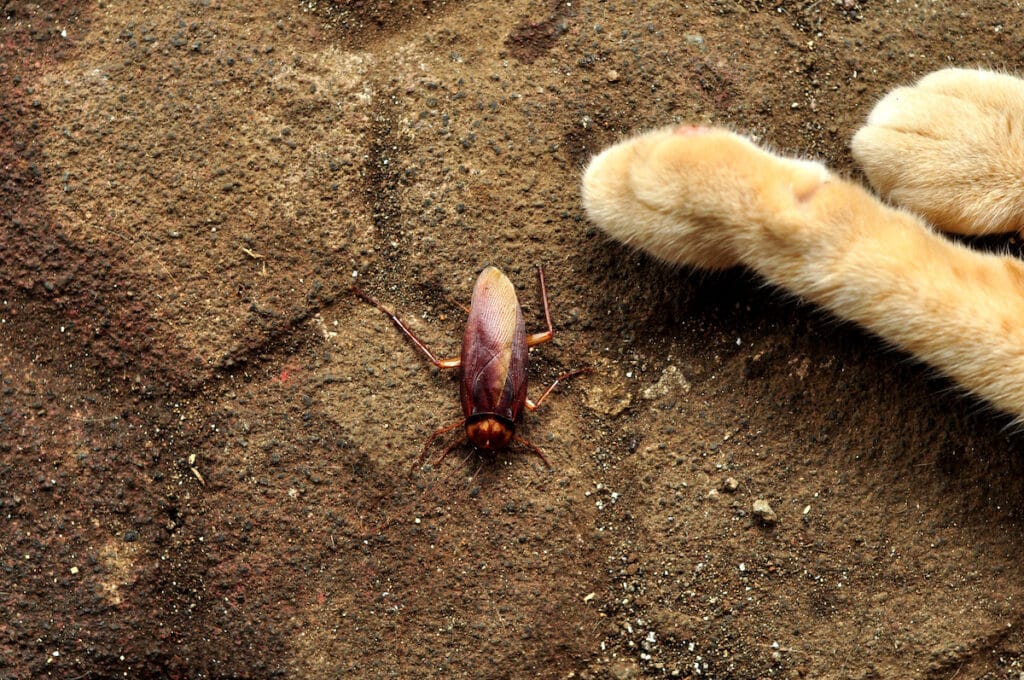Having a cat is a great way to help keep bugs away. However, if your cat eats a poisoned cockroach, what should you do? There are many things you can do to treat a poisoned cockroach and make sure your cat is safe.
Can a cat get worms from a cockroach?
Depending on the type of worms, cats can have various symptoms after eating a cockroach. If the worms are gastrointestinal worms, the affected cat may have diarrhea and vomiting. If they are tapeworms, the cat may also experience anemia. It is important to keep these parasites under control.
There are two main types of worms in cats: roundworms and hookworms. Roundworms are the most common intestinal parasite. Roundworms are tan or milky white in color, with tapered ends. They are three to six inches long. They look like cooked spaghetti. Roundworms are not easily transferred to humans.
Hookworms are smaller than half an inch long, and they live on the lining of the intestine. They suck blood and produce a milky white liquid that is similar to blood. They can live as long as the cat.
Hookworms can be easily recognized, and are generally treated. However, if they become severe, they can cause cutaneous larval migrans, which is an itch that spreads through the body. In severe cases, the cat may have anemia, which may cause death.
Identifying cockroaches with a cat
Identifying poisoned cockroaches with a cat can be a difficult task. In addition to the venom that cockroaches produce, their exoskeleton is also dangerous. Some of the exoskeleton is indigestible and can clog the digestive tract of your cat.
Aside from the exoskeleton, cockroaches are also known to carry parasites and germs. In addition, cockroaches are known to be infested with pesticides. Fortunately, there are safer ways to reduce cockroach populations.
Cats are not only sensitive to smell and hearing, but also have a sophisticated sense of sight. Cats can see up to seven times better than humans in the dark, thanks to a reflective layer of tissue. This is called the tapetum lucidum.
Cats can also sense slight vibrations with their whiskers. When cockroaches are disturbed, they make noise and send out pheromones. These pheromones can be picked up by cats, which then trigger their hunting instincts.
Cockroaches are opportunistic eaters and are easily attracted to crumbs and moisture-filled areas. When they are disturbed, cockroaches can produce a distinctive musty odor.
Preventing cockroaches from coming into contact with your cat
Despite the fact that they are opportunistic eaters, cats do not seem to be particularly fond of eating poisoned cockroaches. The reason for this is not entirely clear. The roaches may be a good source of protein, but their thick exoskeleton makes them difficult to digest. They may also carry harmful germs and parasites.
As a pet owner, you should take precautions to prevent poisoned cockroaches from coming into contact with your cat. You can do so by making sure your cat’s food is stored in a sealed container, and that all food leftovers are cleaned up quickly.
Aside from keeping your pet safe, you should also pay attention to any pest control products you might be using around your home. Some of these may contain boric acid, a substance that can cause serious stomach upset in pets. If you notice your pet vomiting, you should consult your veterinarian.
Roaches can enter your home through pipes or cracks in your walls. They also gather around your cat’s litter box.
Treating a poisoned cockroach
Having a cockroach in your home can be a nuisance. This pest is usually nocturnal, and is found in cracks and crevices. They are very attracted to moist, warm areas, and like sweet and meaty substances. They can also be a source of allergens and asthma triggers. It can be difficult to get rid of cockroaches. The first step is to try and prevent them from entering your home. This can be done by sealing cracks and fixing plumbing. Keeping your kitchen clean and preventing the use of greasy utensils will also help keep cockroaches away.
Another option is to try and get rid of the cockroach by killing them. There are several different types of poisons available, such as boric acid, which is found in roach traps. While boric acid has been used to get rid of cockroaches for years, it can cause upset stomachs in some people. It is usually harmless, but it can be dangerous for cats.














